高中英语时态总结
高中16种英语时态总结归纳学习资料
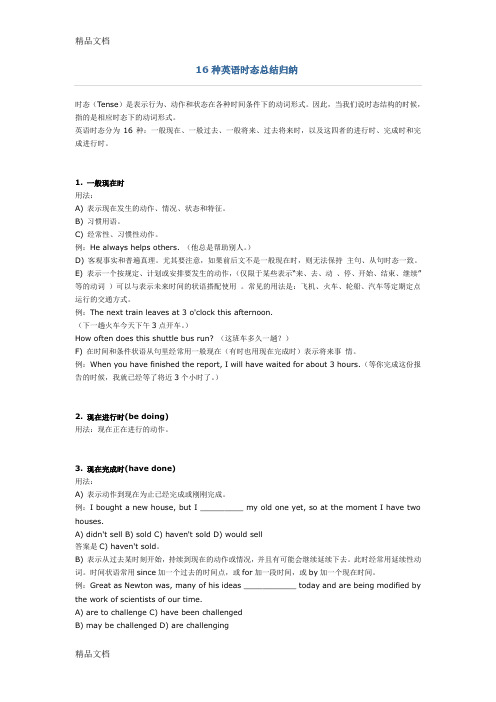
时态(Tense)是表示行为、动作和状态在各种时间条件下的动词形式。
因此,当我们说时态结构的时候,指的是相应时态下的动词形式。
英语时态分为16种:一般现在、一般过去、一般将来、过去将来时,以及这四者的进行时、完成时和完成进行时。
1. 一般现在时用法:A) 表示现在发生的动作、情况、状态和特征。
B) 习惯用语。
C) 经常性、习惯性动作。
例:He always helps others. (他总是帮助别人。
)D) 客观事实和普遍真理。
尤其要注意,如果前后文不是一般现在时,则无法保持主句、从句时态一致。
E) 表示一个按规定、计划或安排要发生的动作,(仅限于某些表示“来、去、动、停、开始、结束、继续”等的动词)可以与表示未来时间的状语搭配使用。
常见的用法是:飞机、火车、轮船、汽车等定期定点运行的交通方式。
例:The next train leaves at 3 o'clock this afternoon.(下一趟火车今天下午3点开车。
)How often does this shuttle bus run? (这班车多久一趟?)F) 在时间和条件状语从句里经常用一般现在(有时也用现在完成时)表示将来事情。
例:When you have finished the report, I will have waited for about 3 hours.(等你完成这份报告的时候,我就已经等了将近3个小时了。
)2. 现在进行时(be doing)用法:现在正在进行的动作。
3. 现在完成时(have done)用法:A) 表示动作到现在为止已经完成或刚刚完成。
例:I bought a new house, but I _________ my old one yet, so at the moment I have two houses.A) didn't sell B) sold C) haven't sold D) would sell答案是C) haven't sold。
高中英语时态总结
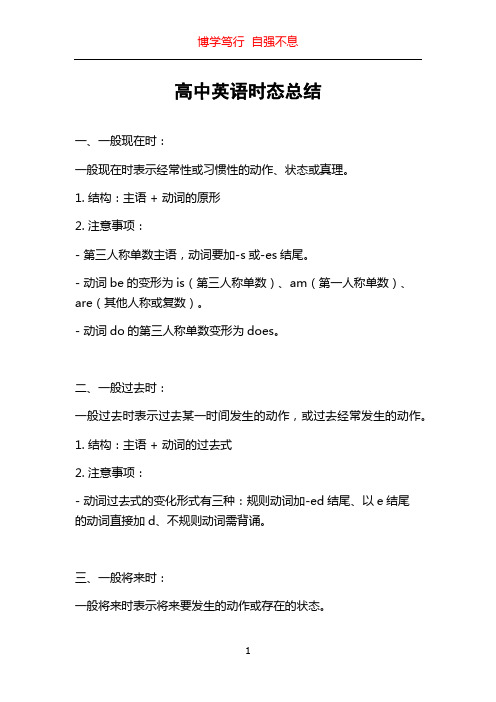
高中英语时态总结一、一般现在时:一般现在时表示经常性或习惯性的动作、状态或真理。
1. 结构:主语 + 动词的原形2. 注意事项:- 第三人称单数主语,动词要加-s或-es结尾。
- 动词be的变形为is(第三人称单数)、am(第一人称单数)、are(其他人称或复数)。
- 动词do的第三人称单数变形为does。
二、一般过去时:一般过去时表示过去某一时间发生的动作,或过去经常发生的动作。
1. 结构:主语 + 动词的过去式2. 注意事项:- 动词过去式的变化形式有三种:规则动词加-ed结尾、以e结尾的动词直接加d、不规则动词需背诵。
三、一般将来时:一般将来时表示将来要发生的动作或存在的状态。
1. 结构:主语 + will + 动词的原形2. 注意事项:- 当主语为第一人称时,可用shall代替will。
- 当表示将来的时间副词或状语连用时,将来时常和动词的原形连用。
四、现在进行时:现在进行时表示现在正在发生的动作。
1. 结构:主语 + am/is/are + 动词的ing形式2. 注意事项:- 动词-ing形式的构成规则为动词原形结尾加-ing。
- 动词末尾的e需去掉,再加-ing。
- 重读闭音节,末尾只有一个辅音字母时,应将末尾辅音字母双写,再加-ing。
五、过去进行时:过去进行时表示过去某一时间正在进行的动作。
1. 结构:主语 + was/were + 动词的ing形式2. 注意事项:- 动词-ing形式的构成规则同现在进行时。
- 句中使用过去进行时时,一般还需要使用表状态动词的动词-ing 形式。
六、将来进行时:将来进行时表示将来某一时间正在进行的动作。
1. 结构:主语 + will be + 动词的ing形式2. 注意事项:- 动词-ing形式的构成规则同现在进行时。
七、一般过去将来时:一般过去将来时表示过去的某个过去时间点本来要发生的事情,但实际上未发生。
1. 结构:主语 + would + 动词的原形2. 注意事项:- would在句中只表示动词的一种形式,无人称和数的变化。
高中英语时态总结
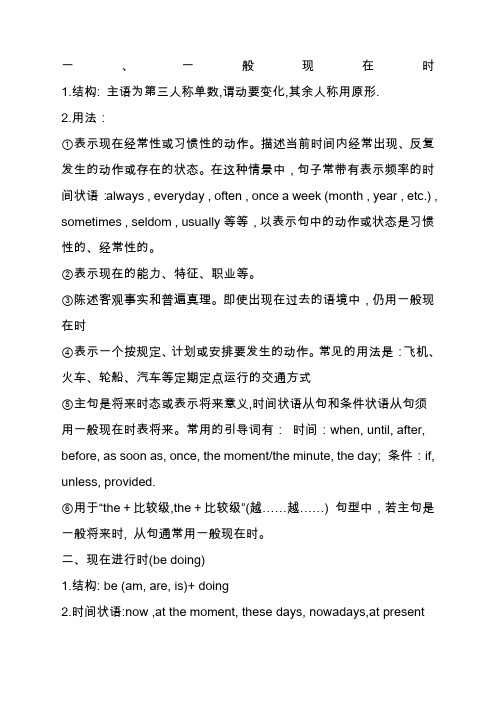
一、一般现在时1.结构: 主语为第三人称单数,谓动要变化,其余人称用原形.2.用法:①表示现在经常性或习惯性的动作。
描述当前时间内经常出现、反复发生的动作或存在的状态。
在这种情景中,句子常带有表示频率的时间状语:always , everyday , often , once a week (month , year , etc.) , sometimes , seldom , usually等等,以表示句中的动作或状态是习惯性的、经常性的。
②表示现在的能力、特征、职业等。
③陈述客观事实和普遍真理。
即使出现在过去的语境中,仍用一般现在时④表示一个按规定、计划或安排要发生的动作。
常见的用法是:飞机、火车、轮船、汽车等定期定点运行的交通方式⑤主句是将来时态或表示将来意义,时间状语从句和条件状语从句须用一般现在时表将来。
常用的引导词有:时间:when, until, after, before, as soon as, once, the moment/the minute, the day; 条件:if, unless, provided.⑥用于“the+比较级,the+比较级”(越……越……) 句型中,若主句是一般将来时, 从句通常用一般现在时。
二、现在进行时(be doing)1.结构: be (am, are, is)+ doing2.时间状语:now ,at the moment, these days, nowadays,at present3.用法:主要用来描述正在发生的动作,或是"现阶段"一直在进行的动作。
①表示现在( 指说话时)正在发生的事情。
②表示目前这段时间内正在进行的动作,但说话时动作未必正在进行③现在进行时表示将来,主要表示在近期按计划或安排要发生的动作④现在进行时与always/forever/constantly /continuously/all the time 等副词连用表示反复或习惯性的动作,表示说话人的情感,如:赞许、批评;喜欢、厌恶等。
高中英语时态总结
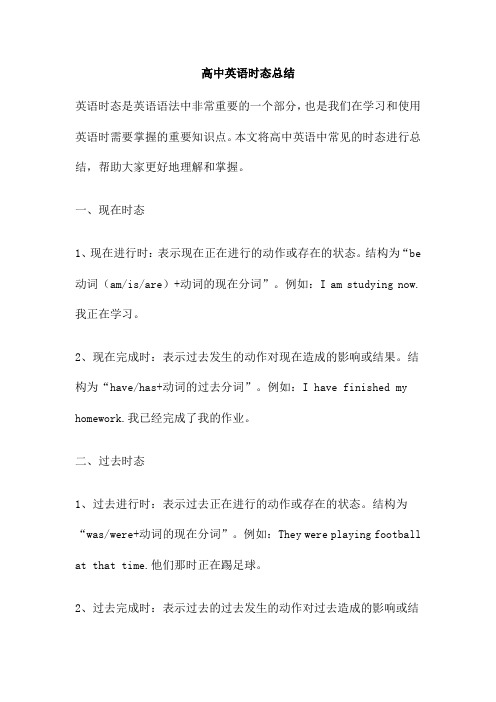
高中英语时态总结英语时态是英语语法中非常重要的一个部分,也是我们在学习和使用英语时需要掌握的重要知识点。
本文将高中英语中常见的时态进行总结,帮助大家更好地理解和掌握。
一、现在时态1、现在进行时:表示现在正在进行的动作或存在的状态。
结构为“be 动词(am/is/are)+动词的现在分词”。
例如:I am studying now.我正在学习。
2、现在完成时:表示过去发生的动作对现在造成的影响或结果。
结构为“have/has+动词的过去分词”。
例如:I have finished my homework.我已经完成了我的作业。
二、过去时态1、过去进行时:表示过去正在进行的动作或存在的状态。
结构为“was/were+动词的现在分词”。
例如:They were playing football at that time.他们那时正在踢足球。
2、过去完成时:表示过去的过去发生的动作对过去造成的影响或结果。
结构为“had+动词的过去分词”。
例如:They had finished their work before we arrived.他们在我们到达之前已经完成了他们的工作。
三、将来时态1、将来进行时:表示将来某个时间正在进行的动作或存在的状态。
结构为“will+be动词+动词的现在分词”。
例如:I will be studying at 9 o’clock tomorrow.我明天9点将会在学习。
2、将来完成时:表示将来某个时间已经完成的动作或达到的状态。
结构为“will+have+动词的过去分词”。
例如:I will have finished my homework by 10 o’clock tonight.我将在今晚10点之前完成我的作业。
以上是高中英语中常见的时态总结,希望能够帮助大家更好地理解和掌握英语时态。
需要注意的是,不同的时态有着不同的用法和结构,大家在使用时需要根据语境选择合适的时态。
高中英语时态总结
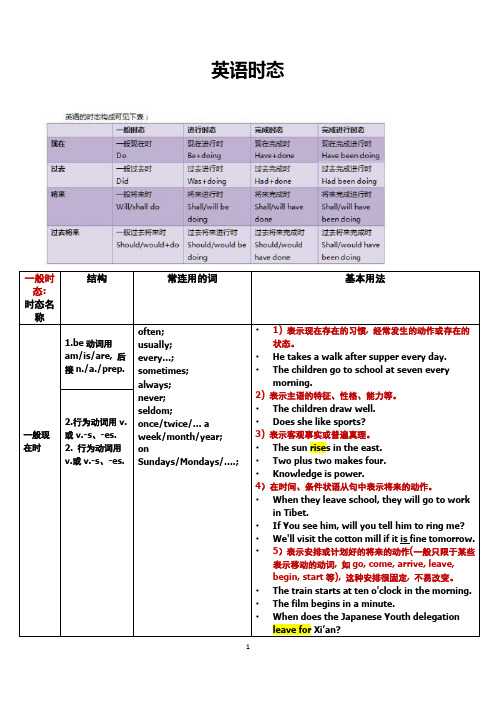
英语时态一般时态:时态名称结构常连用的词基本用法一般现在时1.be动词用am/is/are, 后接n./a./prep.often;usually;every…;sometimes;always;never;seldom;once/twice/… aweek/month/year;onSundays/Mondays/….;•1) 表示现在存在的习惯, 经常发生的动作或存在的状态。
•He takes a walk after supper every day.•The children go to school at seven everymorning.2)表示主语的特征、性格、能力等。
•The children draw well.•Does she like sports?3) 表示客观事实或普遍真理。
•The sun rises in the east.•Two plus two makes four.•Knowledge is power.4)在时间、条件状语从句中表示将来的动作。
•When they leave school, they will go to workin Tibet.•If You see him, will you tell him to ring me?•We'll visit the cotton mill if it is fine tomorrow.•5)表示安排或计划好的将来的动作(一般只限于某些表示移动的动词, 如go, come, arrive, leave,begin, start等), 这种安排很固定, 不易改变。
•The train starts at ten o'clock in the morning.•The film begins in a minute.•When does the Japanese Youth delegationleave for Xi’an?2.行为动词用v.或v.-s、-es.2. 行为动词用v.或v.-s、-es.1.________ a concert next Saturday?2. A.There will be B.Will there be C.There can be D.There are3.It’s good t o see you again, Agnes.— This has been our first chance to visit since from Iran.4. A.you return B.you returned C.you have returned D.returning5.If it ________ tomorrow, we’ll go roller-skating.A.isn’t rainB.won’t rainC.doesn’t rainD.doesn’t fine4.The reporter said that the UFO ___ east to west when he saw it.A.was travelingB.traveledC.had been travelingD.was to travel5.Sorry, I can’t open the door, for I the key to it.A.lostB.loseC.had lostD.have lost6.“What ' s the matter, Ali? You look sad.”“Oh, nothing much.As a matter of fact, I ___ of my friends back home.”A.just thoughtB.have just been thinkingC.was just thinkingD.have just thought7.—Did you expect Frank to come to the party? —No, but I had hoped .A.him comingB.him to comeC.that he comesD.that he would come8.—Bob must be very wealthy.—Yes, he more in one day than I do in a week.A.has been earnedB.had earnedC.earnsD.has earned9.I first met Lisa three years ago.She ___ at a radio shop at the time.A.has workedB.was workingC.had been workingD.had worked10.She _____her keys in the office so she had to wait until her husband ____home.A has left; comesB had left; would comeC had left; cameD left; had come11.Zhao Lan ______already ______in this school for two years.12.A.was ; studying B.will ; study C.has ; studied D.are ; studying---Mr Gorden asked me to remind you of the meeting this afternoon .Don’t forget it !---OK.I ______ .13.A.won't B.don't C.will D.do14.When I reached home, my parents __________their supper.15.A.are having B.have already had C.have had D.had already had16.She __________in this school ________the past ten years.A.was teaching, sinceB.had been teaching, since17.C.would teach, for D.has been teaching, forI first met Tom 10 years ago.He ______ in a radio factory at that time.18.A.had worked B.has worked C.was working D.has been working19.--- What ______ when I phoned you?--- I ______ my work, and I wanted to go out.A.have you done; finishedB.were you doing; have finished20.C.did you do; had just finished D.were you doing; had just finished21.I used to drink a lot of tea but these days I ______ coffee.22.A.prefer B.preferred C.had preferred D.am preferringJim talked for about half an hour yesterday.Never ______ him talk so much.23.A.I heard B.did I hear C.I had heard D.had I heard24.He ___ articles for our wall-newspaper these three years, and he ____ about fortyarticles.A.has been writing; has writtenB.had been writing; wrote25.C.is writing; has been writing D.has written; has written26.When he was alive, the old scientist used to say that knowledge ______ from practice andhe gained his experience by doing a lot of practical work.27.A.was coming B.had come es D.would come28.--- How are you planning to travel to Shanghai?--- I ______ yet, but I ______ taking a train.A.didn’t decide; am consideringB.haven’t decided; consider29.C.haven’t decided; am considering D.hadn’t decided; have considered30.--- Who’s the man over there?--- It’s Jack.--- Oh? ______ in Italy.A.I think he’sB.I’ve thought he’s been31.C.I thought he was D.I’d thought he’d beenI thought Jim would say something about his school report, but he ______ it.32.A.doesn’t mention B.hadn’t mentioned C.didn’t mention D.hasn’t mentioned33.—How long ________ each other before they ________ married?—For about a year.A.have they known; getB.did they know; getC.do they know; are going to getD.had they known; gotWe would like to go and thank him ourselves, but we ________ out his address yet,A.haven’t foundB.hadn’t foundC.didn’t findD.don’t find34.Shirley ________ a book about China last year but I don’t know whether she has finished.A.has writtenB.wroteC.had writtenD.was writing35.—Do you know when Tom ________ from abroad?—Perhaps it will be a long time before he ________ back.A.will come; will comees; will comeC.will come; comeses; comesThe pen I ________ I ________ is on my desk, right under my nose.A.think; lostB.thought; had lostC.think; had lostD.thought; lostHowever hard you ________, you will never succeed in pleasing her.A.tryB.will tryC.should tryD.would try36.By this time tomorrow we ________ the machine.A.have repairedB.shall have repairedC.will repairD.would repair37.I ________ the room to be empty but found it occupied.A.had thoughtB.have thoughtC.didn’t thinkD.was thinking。
高中英语知识点总结:十六种时态

高中英语知识点总结:十六种时态十六种时态:一般现在时,一般过去时,一般将来时,一般过去将来时;现在进行时,过去进行时,将来进行时,过去将来进行时;现在完成时,过去完成时,将来完成时,过去将来完成时;现在完成进行时,过去完成进行时,将来完成进行时,过去将来完成进行时.一、一般现在时:take形式为原形例子:It takes me five years to finish the painting。
这幅画花了我十年功夫1.概念:经常、反复发生的动作或行为及现在的某种状况。
2.时间状语:always,usually,often,sometimes,everyweek(day,year,month…),once a week,on Sundays,3.基本结构:动词原形(如主语为第三人称单数,动词上要改为第三人称单数形式)二、一般过去时:take形式为took.1.概念:过去某个时间里发生的动作或状态;过去习惯性、经常性的动作、行为。
2.时间状语:ago,yesterday,the day beforeyesterday,lastweek,last(year,night,month…),in1989,just now,at the age of 5,one day,long long ago,once up on a time,etc.3.基本结构:be动词;行为动词的过去式三、现在进行时:take形式为am/is/are taking1.概念:表示现阶段或说话时正在进行的动作及行为。
2.时间状语:now,at this time,these days,etc.3.基本结构:am/is/are+doing四、过去进行时:take形式为was/were+taking1.概念:表示过去某段时间或某一时刻正在发生或进行的行为或动作。
2.时间状语:at this time yesterday,at that time或以when引导的谓语动词是一般过去时的时间状语等。
高中英语语法16种时态经典总结
高中英语语法16种时态经典总结The 16 Tenses in English Grammar: A Classic SummaryTenses are an important grammatical category in English。
They express the time of an n or state and the way in which it happened or is happening。
The time can be present。
past。
future。
or past future。
while the way can be simple。
perfect。
progressive。
or perfect progressive。
Combining these two aspects results in 16 tenses。
using "do" as an example:1.SimplePresent Simple: do2.PerfectPresent Perfect: have donePast Perfect: had doneFuture Perfect: will have done3.ProgressivePresent Progressive: is doingPast Progressive: was doingFuture Progressive: will be doing4.Perfect ProgressivePresent Perfect Progressive: have been doingPast Perfect Progressive: had been doingFuture Perfect Progressive: will have been doing5.Past FuturePast Future Simple: would doPast Future Perfect: would have donePast Future Progressive: would be doingPast Future Perfect Progressive: would have been doingNote: The auxiliary verbs "be" (is。
高中16种英语时态总结归纳
高中16种英语时态总结归纳1. Simple Present Tense:- Used for regular actions or habits, and general truths.- Form: Base form of the verb (e.g. I go, he/she/it goes).2. Present Continuous Tense:- Used to describe actions happening at the moment of speaking, or for future arrangements.- Form: am/is/are + present participle (e.g. I am writing, he/she/it is reading).3. Present Perfect Tense:- Used for actions that happened at an unspecified timein the past, and have relevance to the present.- Form: has/have + past participle (e.g. I have seen,he/she/it has done).4. Present Perfect Continuous Tense:- Used for actions that started in the past and continue into the present, and emphasize duration.- Form: has/have been + present participle (e.g. I have been waiting, he/she/it has been working).5. Simple Past Tense:- Used for actions that started and finished at aspecific time in the past.- Form: Past form of the verb (e.g. I went, he/she/it played).6. Past Continuous Tense:- Used to emphasize the duration of an action in the past, or for two actions happening simultaneously in the past.- Form: was/were + present participle (e.g. I was sleeping, he/she/it was writing).7. Past Perfect Tense:- Used to describe an action that happened before another action in the past.- Form: had + past participle (e.g. I had seen, he/she/it had finished).8. Past Perfect Continuous Tense:- Used to show the duration of an action that happened before another action in the past.- Form: had been + present participle (e.g. I had been waiting, he/she/it had been studying).9. Simple Future Tense:- Used to talk about actions that will happen in the future.- Form: will/shall + base form of the verb (e.g. I will go, he/she/it will eat).10. Future Continuous Tense:- Used to describe actions that will be ongoing at a specific time in the future.- Form: will/shall be + present participle (e.g. I will be waiting, he/she/it will be working).11. Future Perfect Tense:- Used for actions that will be completed before another action in the future.- Form: will have + past participle (e.g. I will have finished, he/she/it will have left).12. Future Perfect Continuous Tense:- Used to emphasize the duration of an action that will be completed before another action in the future.- Form: will have been + present participle (e.g. I will have been waiting, he/she/it will have been studying).13. Present Unreal Conditional:- Used to talk about hypothetical situations in the present or future, expressing results that are unlikely or impossible.- Form: if + simple past, would + base form (e.g. If I were rich, I would travel the world).14. Past Unreal Conditional:- Used to talk about hypothetical situations in the past, expressing results that didn't happen.- Form: if + past perfect, would have + past participle(e.g. If I had studied harder, I would have passed the test).15. Mixed Tenses:- Used to describe actions that happen at the same time but in the past and present or future.- Form: Mix of different tenses.16. Future Time Clauses:- Used to indicate two actions happening in the future, with the main clause in the future and the time clause in the present.- Form: Present tense in the time clause, will/shall or other future tense in main clause (e.g. When I am 25, I will have graduated).。
高中三年16种英语时态
高中三年16种英语时态英语时态是我们常用且会学习到的一个知识点,那么多余多样的英语时态,我们该如何高效的学习呢,下面就是小编给大家带来的高考16中英语时态的总结,希望能帮助到大家!一般现在时(do/does; is/am/are)①表示现在的情况、状态或特征。
例:He is a student. 他是一个学生。
②表示经常性、习惯性动作。
例:He always helps others. 他总是帮助别人。
③客观事实和普遍真理。
例:The earth moves the sun. 地球绕着太阳转。
④表示一个按规定、计划或安排要发生的动作。
仅限于某些表示“来、去、动、停、开始、结束、继续”等的动词,可以与表示未来时间的状语搭配使用。
常见的用法是:飞机、火车、轮船、汽车等定期定点运行的交通方式。
例:The next train leaves at 3 o'clock this afternoon.下一趟火车今天下午3点开车。
⑤在时间、条件和让步状语从句中经常用一般现在(有时也用现在完成时)表示将的来事情。
(即:主将从现原则)例:I will call you as soon as I arrive at the airport.我一到机场就会给你打电话。
When you have finished the report, I will have waited for about 3 hours.等你完成这份报告的时候,我就已经等了将近3个小时了。
现在进行时(am/is/are doing)①表示此时此刻正在发生的事情。
例:He is listning to the music now.他现在正在听音乐。
②表示目前一段时间内一直在做的事情,但不一定此时此刻正在做。
例:I am studying computer this term.这个学期我一直在学习计算机。
③现在进行时可以表示将来的含义。
a. 瞬时动词的进行一定表将来。
高中英语时态总结
高中英语时态总结高中英语时态总结一、一般现在时态(Simple Present Tense)1. 表示现在正在发生的动作或状态。
例:I go to school every day(我每天都去上学)。
2. 表示经常性的动作或状态。
例:She always brushes her teeth before going to bed(她睡觉前总是刷牙)。
3. 表示真理、普遍事实或科学道理。
例:The sun rises in the east(太阳从东方升起)。
4. 用于表示将来的时间状语从句中,表示计划、安排或打算。
例:He will go to the cinema if he finishes his homework(如果他完成作业的话,他将去电影院)。
二、现在进行时态(Present Continuous Tense)1. 表示现在正在进行的动作。
例:She is reading a book now(她现在正在读书)。
2. 表示计划或安排好的即将要发生的动作。
例:We are going to the park this weekend(我们这个周末要去公园)。
三、一般过去时态(Simple Past Tense)1. 表示过去某个时间发生的动作或状态。
例:We went to the beach last summer(去年夏天我们去了海滩)。
2. 表示过去的习惯或经常发生的动作。
例:When I was a child, I played football every day(我小的时候,我每天都踢足球)。
四、过去进行时态(Past Continuous Tense)1. 表示过去某个时间正在进行的动作。
例:I was watching TV when he called(他打电话的时候,我正在看电视)。
2. 表示过去同时发生的两个或多个动作。
例:While mom was cooking, dad was reading a book(妈妈在做饭的时候,爸爸在看书)。
- 1、下载文档前请自行甄别文档内容的完整性,平台不提供额外的编辑、内容补充、找答案等附加服务。
- 2、"仅部分预览"的文档,不可在线预览部分如存在完整性等问题,可反馈申请退款(可完整预览的文档不适用该条件!)。
- 3、如文档侵犯您的权益,请联系客服反馈,我们会尽快为您处理(人工客服工作时间:9:00-18:30)。
英语时态时态名称结构常连用的词基本用法一般现在时1. be动词用am/is/are,后接n./a./prep.often;usually;every…;sometimes;always;never;seldom;once/twice/… aweek/month/year;onSundays/Mondays/….;1) 表示现在存在的习惯,经常发生的动作或存在的状态。
•He takes a walk after supper every day.•The children go to school at seven everymorning.2)表示主语的特征、性格、能力等。
•The children draw well.•Does she like sports?3) 表示客观事实或普遍真理。
•The sun rises in the east.•Two plus two makes four.•Knowledge is power.4)在时间、条件状语从句中表示将来的动作。
•When they leave school, they will go to workin Tibet.•If You see him,will you tell him to ring me?•We'll visit the cotton mill if it is fine tomorrow.5)表示安排或计划好的将来的动作(一般只限于某些表示移动的动词,如go,come,arrive, leave,begin, start等),这种安排很固定,不易改变。
•The train starts at ten o'clock in the morning.•The film begins in a minute.•When does the Japanese Youth delegationleave for Xi’an?2. 行为动词用v.或v.-s、-es.1.________ a concert next Saturday?A. There will beB. Will there beC. There can beD. There are2.It’s good to see you again, Agnes.— This has been our first chance to visit since from Iran.A. you returnB. you returnedC. you have returnedD. returning3.If it ________ tomorrow, we’ll go r oller-skating.A. isn’t rainB. won’t rainC. doesn’t rainD. doesn’t fine4. The reporter said that the UFO ___ east to west when he saw it.A. was travelingB. traveledC. had been travelingD. was to travel5. Sorry, I can’t open the door, for I the key to it.A. lostB. loseC. had lostD. have lost6. “ What ' s the matter, Ali? You look sad. ”“ Oh, nothing much. As a matter of fact, I ___ of my friends back home. ”A. just thoughtB. have just been thinkingC. was just thinkingD. have just thought7. — Did you expect Frank to come to the party? — No, but I had hoped .A. him comingB. him to comeC. that he comesD. that he would come8. — Bob must be very wealthy. — Yes, he more in one day than I do in a week.A. has been earnedB. had earnedC. earnsD. has earned9. I first met Lisa three years ago. She ___ at a radio shop at the time.A. has workedB. was workingC. had been workingD. had worked10. She _____her keys in the office so she had to wait until her husband ____home.A has left; comesB had left; would comeC had left; cameD left; had come11. Zhao Lan ______already ______in this school for two years.A. was ; studyingB. will ; studyC. has ; studiedD. are ; studying12.---Mr Gorden asked me to remind you of the meeting this afternoon . Don’t forget it !---OK. I ______ .A. won'tB. don'tC. willD. do13.When I reached home, my parents __________their supper.A.are havingB.have already hadC.have hadD. had already had14.She __________in this school ________the past ten years.A.was teaching, sinceB. had been teaching, sinceC.would teach, forD. has been teaching, for15.I first met Tom 10 years ago. He ______ in a radio factory at that time.A. had workedB. has workedC. was workingD. has been working16.--- What ______ when I phoned you?--- I ______ my work, and I wanted to go out.A. have you done; finishedB. were you doing; have finishedC. did you do; had just finishedD. were you doing; had just finished17.I used to drink a lot of tea but these days I ______ coffee.A. preferB. preferredC. had preferredD. am preferring18.Jim talked for about half an hour yesterday. Never ______ him talk so much.A. I heardB. did I hearC. I had heardD. had I heard19.He ___ articles for our wall-newspaper these three years, and he ____ about fortyarticles.A. has been writing; has writtenB. had been writing; wroteC. is writing; has been writingD. has written; has written20.When he was alive, the old scientist used to say that knowledge ______ from practice andhe gained his experience by doing a lot of practical work.A. was comingB. had comeC. comesD. would come21.--- How are you planning to travel to Shanghai?--- I ______ yet, but I ______ taking a train.A. didn’t decide; am consideringB. haven’t decided; considerC. haven’t decided; am consideringD. hadn’t decided; have considered22.--- Who’s the man over there?--- It’s Jack.--- Oh? ______ in Italy.A. I think he’sB. I’ve thought he’s beenC. I thought he wasD. I’d thought he’d been23.I thought Jim would say something about his school report, but he ______ it.A. doesn’t mentionB. hadn’t mentionedC. didn’t mentionD. hasn’t mentioned24.—How long ________ each other before they ________ married?—For about a year.A.have they known; getB.did they know; getC.do they know; are going to getD.had they known; got25.We would like to go and thank him ourselves,but we ________ out his address yet,A.haven’t foundB.hadn’t foundC.didn’t findD.don’t find26.Shirley ________ a book about China last year but I don’t know wheth er she has finished.A.has writtenB.wroteC.had writtenD.was writing27.—Do you know when Tom ________ from abroad?—Perhaps it will be a long time before he ________ back.A.will come; will comees; will comeC.will come; comeses; comes28.The pen I ________ I ________ is on my desk,right under my nose.A.think; lostB.thought; had lostC.think; had lostD.thought; lost29.However hard you ________,you will never succeed in pleasing her.A.tryB.will tryC.should tryD.would try30.By this time tomorrow we ________ the machine.A.have repairedB.shall have repairedC.will repairD.would repair31.I ________ the room to be empty but found it occupied.A.had thoughtB.have thoughtC.didn’t thinkD.was thinking。
